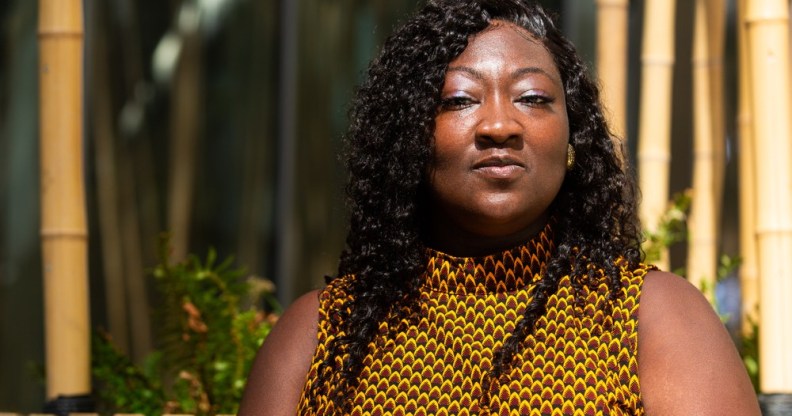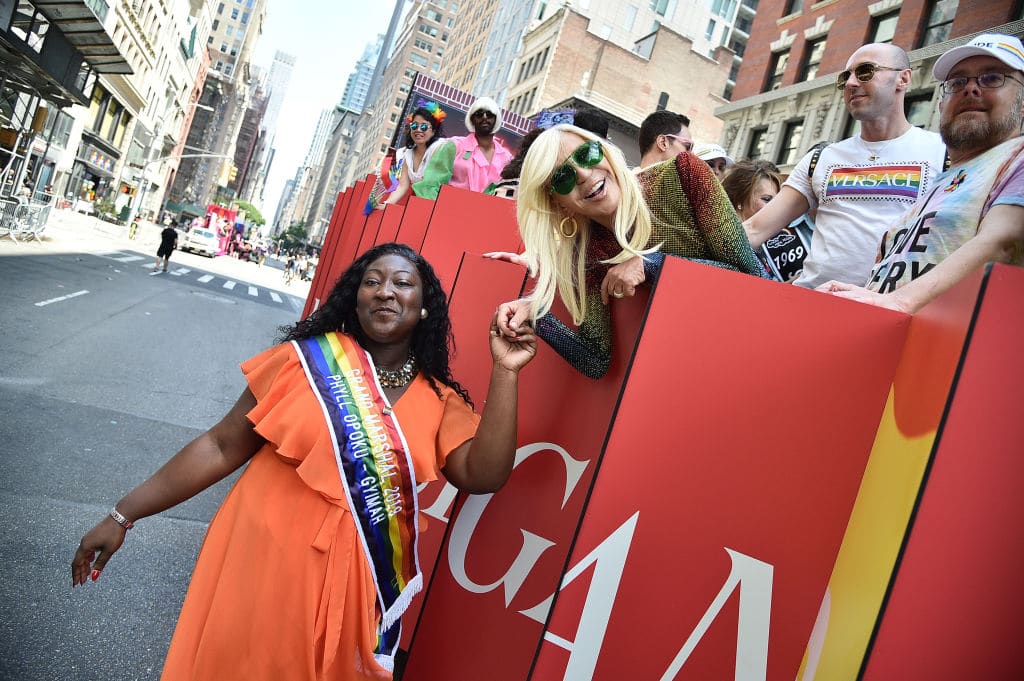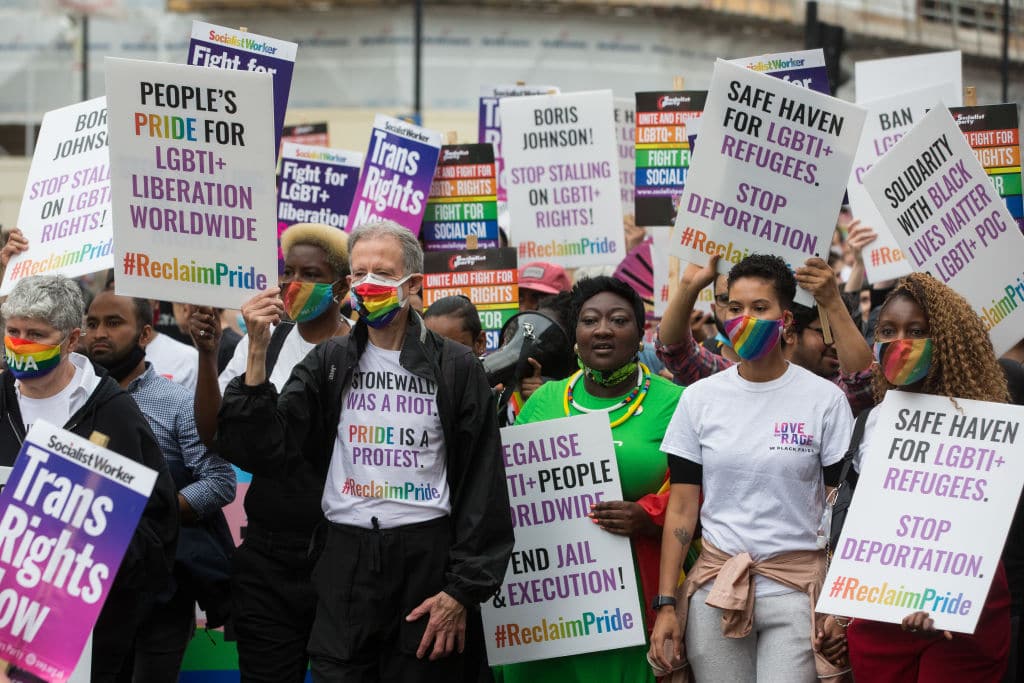Icon and activist Lady Phyll explains Britain’s role in spreading anti-LGBT+ hate across the world

Lady Phyll, co-founder of UK Black Pride and executive director of Kaleidoscope Trust (Corinne Cumming)
We often hear people talk about countries across the world where it’s illegal to be gay – but what’s often missing from the conversation is the role Britain played in creating those laws.
The fact of the matter is that many of the countries that continue to criminalise homosexuality today were once colonised by the British. They brought their punitive measures to combat homosexuality to those countries. Many of those measures remain in place long after British colonial rule came to an end.
The story of British colonisation and the impact it had on anti-LGBT+ laws across the world is a complex one. Few people understand the complexity of those laws – and the challenges that persist in removing them – better than Phyll Opoku-Gyimah, the trailblazing lesbian activist who now serves as executive director of the Kaleidoscope Trust. The organisation was founded a decade ago to campaign for the human rights of LGBT+ people across the world.
The Kaleidoscope Trust notes that 69 countries around the world criminalise LGBT+ people because of who they are. In 34 of those countries, anti-LGBT+ laws were first put in place under British colonial rule.
LGBT+ people across the world have been impacted “in ways that are unimaginable” by colonial-era laws that criminalise homosexuality, Lady Phyll tells PinkNews. Understanding the full impact isn’t an easy task – the effects have been far reaching.

Phyll Opoku-Gyimah (Lady Phyll) and Donatella Versace attend Pride March – WorldPride NYC 2019 on June 30, 2019. (Theo Wargo/Getty)
“When we think about these colonial era laws that exist in Commonwealth countries, we can’t help but to discuss the issues of racism, of patriarchy, of sexism, but also of things that have been stolen, things that have been taken away, and things that have been put in their place – be it a particular religion, faith, or the ways that language has been taken,” Phyll says. “So when you look at all of the things compounded by what the empire and colonialism did, you know that people will undoubtedly have been impacted in ways that are unimaginable.
“This is why today, we have LGBT+ people trying to navigate systems of oppression which keep them locked in and bound by hurt and pain and harm, because the laws that seek to criminalise them were left there through colonialism.”
Society mustn’t take its foot off the pedal on global LGBT+ rights, Lady Phyll says
Some progress has been made, Lady Phyll points out. India has repealed Section 377, a colonial-era code that criminalised sexual acts “against the order of nature”. Botswana and Angola have also struck down similar laws, and the high court of Trinidad and Tobago ruled that the country’s anti-gay laws were unconstitutional in 2018. Things are changing – but change isn’t happening fast enough.
“The UK has moved on so far with equal marriage, with the fact that it’s removed these laws, with the campaigning that happened over Section 28 – but we’ve still got so much to do internationally. I believe that our work is really important because we have been part of the problem in leaving those colonial era laws.
“This is not about making people feel guilty. This is about the realisation of the lived experiences of harm that was caused so many years ago.”
While Lady Phyll doesn’t want people to feel guilty over the UK’s colonial past, it’s clear that many people in Britain are largely unaware of the true impact of colonialism. Lady Phyll notes that there have been acknowledgements – she draws attention to then prime minister Theresa May expressing her “deep regret” over those colonial-era laws in 2017.
“Now, that was powerful,” she says. “That’s actually quite moving, and it shows that it wasn’t just a one time moment for her to say it because she felt she needed to, but it was a real acknowledgement and testament from her herself.”
View this post on Instagram
That resulted in the Kaleidoscope Trust and other organisations receiving additional funding. It was a seismic moment, but it’s also time for us to move past acknowledgements and move towards action to make sure change is actually happening on the ground.
“I think when we’re looking at the issues of things that have been said – the racism that has come through around Grenfell, Windrush, the ‘Go Home’ vans, immigration, asylum – you can’t help but think, how far have we come?” Phyll asks. “Have we really made progress when some of these issues are still harming people in this country? How can we expect to address things that are happening outside of the country?”
Lady Phyll continues: “I don’t want to be all negative and all doom and gloom. I do think that we’re making progress… We’re making headway, but we cannot take our foot off the pedal because actually the people we work with, our partners on the ground, have no choice but to keep on advocating for the changes that they wish to see.”
Anti-LGBT+ laws destroy the mental health and wellbeing of queer people
Those changes are absolutely vital, Lady Phyll says. People will often make the point that anti-LGBT+ laws aren’t always strictly enforced in some places, even when the legislation remains on the books – but that argument is far from a convincing reason to simply sit back and do nothing.
“For those that are saying those laws are not enforced, I guess I would like to know that they had direct lived experience of being in those countries where actually, our research has told us that whether they have been physically or verbally harmed, they know that there’s every possibility that they could be criminalised based on who they love, how they love, and how they present to the world,” Phyll says.
“It takes a toll on one’s mental health and wellbeing knowing that you could be imprisoned, you could be harmed, you could be ostracised or marginalised from your family, you could be seen as a vulnerable person because you’re more at risk of being attacked. I find it difficult that one would say that they’re not enforced when if something is written down in paper, and just because nothing may have happened so far, it doesn’t mean it won’t.
“We can say that there’s no racism in Tottenham in London, but we know that Black people continue to be disproportionately impacted in various ways – socioeconomic, class, status, the way we look at things through an intersectional lens. That would be the same for our LGBT+ partners in countries where there are laws, and even in countries where there aren’t laws that criminalise [LGBT+ people] because people do come with prejudice.”

Peter Tatchell, flanked by Linda Riley and Phyll Opoku-Gyimah, leads thousands of LGBTI+ protesters along Whitehall on the first-ever Reclaim Pride march on 24th July 2021. (Mark Kerrison/In Pictures via Getty)
Phyll says attitudes can only be changed by appealing to people’s humanity – societies across the world must be able to see that LGBT+ people deserve respect and love, just like anybody else.
“We’ve got to change the world, change how our narrative is shaped, change how we communicate what we’re doing, and change hearts and minds to help people understand that this person could be your sister, your brother, your uncle, your auntie, your niece, your nephew, your friend that you went to school with – why would you discriminate because of who they love, how they love and how they present to the world?” Phyll says.
It is for all of these reasons that Phyll joined the Kaleidoscope Trust as executive director in August 2019. She says her heart “fills with joy” when she thinks about the work the charity has done since it was founded a decade ago.
“It’s this very small international LGBT+ human rights charity, but it’s doing so much amazing work,” she says. “Its achievements over the last 10 years have been one, getting accredited for TCEN, which is the Commonwealth Equality Network. In that accreditation, it means we are actually a part of the Commonwealth family, meaning that we’re able to inform, advise, speak to particular issues of sexual orientation, gender identity and expression.
“There’s a lot to be hopeful for, there’s a lot to talk about successes but at the same time we know that there’s still so much to do. I hate using that corny, cheesy line, but we know there really is. Our work doesn’t stop, it continues, as we seek to really address a world that is free, safe and equal.”

